Writing subject information
At Thorpepark Academy we recognise that children are able to communicate and express themselves through their writing. It is our aim to ensure that writing opportunities across the curriculum equip the children with the ability to communicate their ideas, knowledge and emotions confidently and creatively.
Intent
As a school, we aim to deliver high quality teaching that ensures children are able to develop an acquisition of knowledge and skills to write clearly and coherently, in line with the National Curriculum.
Whilst intending to instil a love for writing from an early age, we also strive for independence in adapting language choices and writing features by identifying audiences and purposes. We recognise that good writers have the ability to refine and edit their writing over time. For this reason, we aim for children to develop their independence in identifying their own areas for improvement, enabling them to edit during and after the writing process.
We want children to acquire the basic skills needed to write effectively, such as using advanced vocabulary, gaining a secure understanding of grammatical features and spelling efficiently by applying spelling patterns and rules.
At Thorpepark Academy we intend on children taking pride in their work, including the presentation of their writing, by developing a legible joined handwriting style before leaving primary school.
Implementation
We teach using an adapted Talk for Writing approach throughout the school that involves text imitation, boxing up, toolkits, scaffolded writing and shared writing that ultimately leads up to independent innovations and applications.
Two-week units of writing include a range of genres that are carefully selected to make some cross-curricular links and progress throughout the year groups. Each unit begins with the children being presented with inspiring and engaging materials. Using high quality model texts and familiar texts from our literacy spine enables children to use what they have read to enhance their writing. The children are taught the required basic skills for the particular genre to connect with the intended outcome. The writing process is then modelled through a planning, drafting, editing and redrafting process with clear context and purpose before publishing a final piece. Children’s published pieces are assessed using the teacher assessment frameworks to identify progress made and areas for development.
Throughout the school, teachers often focus on standalone spelling, punctuation and grammar lessons to embed or consolidate learning. Children are then encouraged to apply a greater range of skills across the wider curriculum.
Handwriting is not only taught discreetly but is an essential part of the weekly timetable. Explicit handwriting lessons are taught daily week to encourage legibility and joins.
Further subject information:

“Pupils are exposed to a wide range of high-quality books.”
“Pupils thrive at Thorpepark Academy.”
“Pupils understand how to keep their minds and bodies healthy.”
“There is a truly inclusive ethos.”
“The school’s offer for pupils’ personal development is exceptional.”
“Many parents appreciate the adult learning and volunteering opportunities available to them.”
“Pupils know ways to raise their own self-esteem and that of others.”
“Leaders have designed the curriculum to develop pupils’ sense of belonging, identity and pride in being from Hull.”
“Pupils enjoy being active citizens and getting paid in credits they can spend in the school shop.”
“Pupils learn the importance of contributing to their community.”
“By the end of key stage 2 pupils have secure knowledge in English and mathematics.”
“Pupil ambassadors check on other pupils’ well-being.”
“Leaders, including the trust, ensure that pupil, parent and staff well-being is a top priority.”
“The curriculum for pupils with special educational needs and/or disabilities (SEND) is well designed.”
“Pupils are empathetic and show understanding of other pupils’ needs.”
“Pupils are well prepared for secondary education.”
“Extra-curricular clubs are carefully chosen to stretch individual pupils’ talents in music, sport and other areas, including sewing.”
“Leaders are committed to and highly skilled in supporting pupils who struggle to manage their own behaviour.”
“Children in the early years get off to a good start.”
“Leaders prioritise pupils’ well-being.”
“Lots of initiatives are in place to encourage pupils’ love of reading.”
“Pupils are motivated to learn.”
“Pupils often benefit from bespoke plans which are matched to their needs.”
“Parents work in partnership with leaders and staff.”
“Pupil mentors support younger pupils and those new to the school.”
“Pupils love the ‘Thorpepark 50’.”
“Pupils are motivated to learn. They enjoy lessons and they achieve well.”
“Pupils learn about people and places from their local area in all subjects.”
“Leaders have ensured that the teaching of reading is strong.”
“Leaders know the pupils, their families and the community very well.”






